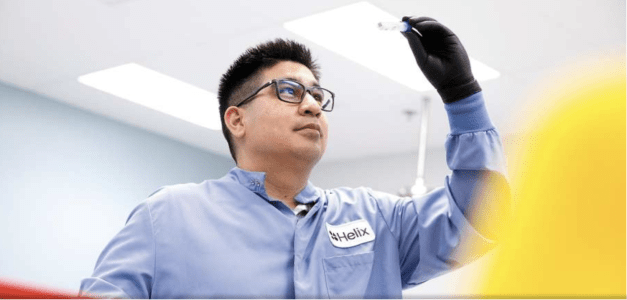Helix, a startup that stores your genetic data online, nets $200 million

San Francisco Chronicle By Catherine Ho
Helix, a San Carlos startup that analyzes and stores customers’ genetic information online, has raised $200 million from venture capital and private equity funds, the company announced Thursday.
Led by DFJ Growth — an investor in Tesla, Tumblr and Coinbase — the new financing brings Helix’s total funding to at least $320 million, signaling investors’ continued interest in the growing genetic testing market.
Helix was founded in 2015 with backing from Illumina, a publicly traded San Diego firm that manufactures and sells DNA-sequencing machines used by labs to process genetic tests. Illumina is Helix’s largest shareholder, though Helix declined to specify Illumina’s ownership stake other than to say it is less than 50 percent.
Helix had previously secured $120 million from Illumina, Kleiner Perkins, Sutter Hill Ventures, Warburg Pincus and Mayo Clinic; they are all contributing to the latest funding round.
Helix occupies an unusual space in the supply chain of DNA sequencing, a global market that is expected to grow to $22 billion by 2025, according to Research and Markets.
Helix does not make or sell “spit kit” products. Rather, it partners with 50 companies and medical centers to send kits to consumers, then processes and stores the DNA data from those tests on its cloud-based server.
Unlike most direct-to consumer genetic tests that analyze short segments of DNA for genetic variants relevant to specific diseases, Helix sequences the exome — the 22,000 genes where mutations are responsible for most clinical diseases. The exome accounts for roughly 3 percent of the whole human genome.
Helix customers pay a one-time $80 fee to have their exome sequenced and stored in the company’s server, and can later take multiple tests that access their DNA information from the same database. A customer, for instance, could take one test for ancestry, then another test for inherited high cholesterol — and authorize Helix to analyze the corresponding segments of the exome for each type of test. Each test requires an additional fee of $10 to $200 and must be sold through one of Helix’s partner companies, creating a closed-loop system analogous to Helix running an operating system and allowing app developers to build on its platform.
Only the customer, Helix and the partner company can access the information. Helix has revenue-sharing arrangements with each of its partners, which include National Geographic, which sells DNA ancestry kits; the Mayo Clinic; and Sema4, a genomics startup spun out of Mount Sinai Health System.
Helix executives declined to share how many customers store their genetic data on its server.
There have been no publicized breaches of people’s DNA data stored in the cloud. Helix CEO Robin Thurston said the company’s investment in data security is “significant.”
“We’re investing a tremendous amount in ensuring consumers protection of their data,” he said. “For everyone in this space, it’s a top priority.”
In 2017, about 7 million DNA samples from direct-to-consumer test kits were processed by labs using Illumina machines — more than double the number from 2016, according to a January report compiled by Illumina. This does not capture the entire market for next-generation sequencing — the technology that enables the entire genome or exome to be sequenced — but it is the vast majority, as Illumina has about 75 percent market share.
“We’re excited about the momentum in the category,” Thurston said. “We believe the tipping point for consumer genomics is here.”
(Photo Credit: San Francisco Chronicle/Catherine Ho, Courtesy Of Helix)